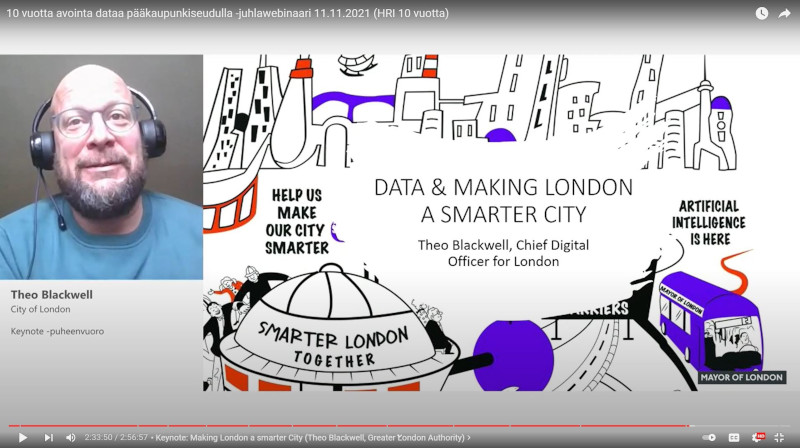HRI 10 Years Anniversary Webinar: London aims to be the number one of smart cities
HRI service was founded in 2011. Last year we celebrated our 10 year anniversary with social media campaigns and an anniversary webinar on November 11th. Over 10 years ago, before HRI was founded, the London Datastore served as an example for the HRI service. We invited Theo Blackwell, the Chief Digital Officer from Greater London Authority, to HRI’s webinar to share London’s future plans.
Published in 2010, the Open Data Service London Datastore still qualifies as a paragon of openness to other cities in the world. The data portal, which has served as one of the models to HRI, distributes more than 6,000 data sets for anyone to use. Now London is taking the next leap towards an open data ecosystem, says Theo Blackwell, the Chief Digital Officer from Greater London Authority.
London data projects now underway focus on the quality of data rather than the quantity. For example, new dynamic maps of London’s green spaces, cultural services and city structures already bring great savings.
“For example, the maps ensure that electricity and fiber optic cables are lowered into the same trench as gas pipelines”, tells Theo Blackwell.
Cooperation with companies is also new. During the Covid-19 pandemic, data from both credit card company Mastercard and mobile operators has provided a real-time snapshot of consumer shopping behaviour on London’s market streets.
The starting point for London’s smart city development was the Congestion Charge system introduced 20 years ago. Now the renewed system, made up of 1000 cameras, data warehouses and billing systems, also charges those arriving downtown with high-emission cars. In the future, 5G telephone networks, artificial intelligence and cheap IoT sensors will drive further digitalisation of urban services.
In 2018, the Smarter London Together plan was written with an aim to lift London to the top of the world’s smart cities. The London Office of Technology and Innovation, which started its operations in 2019, promotes data projects in London’s 32 boroughs. London Datastore is currently being rebuilt to meet the data needs of the future.
The goal is to transform the current passive data distribution into a platform of a living data ecosystem: “Our purpose is to combine public and private sector data. We want to improve decision-making and create new digital services to improve the city and meet growth and climate challenges.”

Translation: HRI Service
